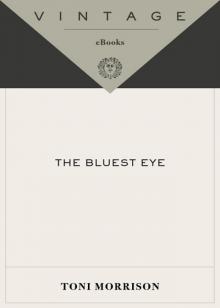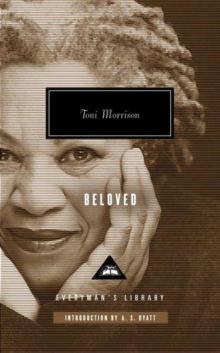- Home
- Toni Morrison
The Bluest Eye Page 5
The Bluest Eye Read online
Page 5
Each pale yellow wrapper has a picture on it. A picture of little Mary Jane, for whom the candy is named. Smiling white face. Blond hair in gentle disarray, blue eyes looking at her out of a world of clean comfort. The eyes are petulant, mischievous. To Pecola they are simply pretty. She eats the candy, and its sweetness is good. To eat the candy is somehow to eat the eyes, eat Mary Jane. Love Mary Jane. Be Mary Jane.
Three pennies had bought her nine lovely orgasms with Mary Jane. Lovely Mary Jane, for whom a candy is named.
Three whores lived in the apartment above the Breedloves’ storefront. China, Poland, and Miss Marie. Pecola loved them, visited them, and ran their errands. They, in turn, did not despise her.
On an October morning, the morning of the stove-lid triumph, Pecola climbed the stairs to their apartment.
Even before the door was opened to her tapping, she could hear Poland singing—her voice sweet and hard, like new strawberries:
I got blues in my mealbarrel
Blues up on the shelf
I got blues in my mealbarrel
Blues up on the shelf
Blues in my bedroom
’Cause I’m sleepin’ by myself
“Hi, dumplin’. Where your socks?” Marie seldom called Pecola the same thing twice, but invariably her epithets were fond ones chosen from menus and dishes that were forever uppermost in her mind.
“Hello, Miss Marie. Hello, Miss China. Hello, Miss Poland.”
“You heard me. Where your socks? You as barelegged as a yard dog.”
“I couldn’t find any.”
“Couldn’t find any? Must be somethin’ in your house that loves socks.”
China chuckled. Whenever something was missing, Marie attributed its disappearance to “something in the house that loved it.” “There is somethin’ in this house that loves brassieres,” she would say with alarm.
Poland and China were getting ready for the evening. Poland, forever ironing, forever singing. China, sitting on a pale-green kitchen chair, forever and forever curling her hair. Marie never got ready.
The women were friendly, but slow to begin talk. Pecola always took the initiative with Marie, who, once inspired, was difficult to stop.
“How come you got so many boyfriends, Miss Marie?”
“Boyfriends? Boyfriends? Chittlin’, I ain’t seen a boy since nineteen and twenty-seven.”
“You didn’t see none then.” China stuck the hot curlers into a tin of Nu Nile hair dressing. The oil hissed at the touch of the hot metal.
“How come, Miss Marie?” Pecola insisted.
“How come what? How come I ain’t seen a boy since nineteen and twenty-seven? Because they ain’t been no boys since then. That’s when they stopped. Folks started gettin’ born old.”
“You mean that’s when you got old,” China said.
“I ain’t never got old. Just fat.”
“Same thing.”
“You think ’cause you skinny, folks think you young? You’d make a haint buy a girdle.”
“And you look like the north side of a southbound mule.”
“All I know is, them bandy little legs of yours is every bit as old as mine.”
“Don’t worry ’bout my bandy legs. That’s the first thing they push aside.”
All three of the women laughed. Marie threw back her head. From deep inside, her laughter came like the sound of many rivers, freely, deeply, muddily, heading for the room of an open sea. China giggled spastically. Each gasp seemed to be yanked out of her by an unseen hand jerking an unseen string. Poland, who seldom spoke unless she was drunk, laughed without sound. When she was sober she hummed mostly or chanted blues songs, of which she knew many.
Pecola fingered the fringe of a scarf that lay on the back of a sofa. “I never seen nobody with as many boyfriends as you got, Miss Marie. How come they all love you?”
Marie opened a bottle of root beer. “What else they gone do? They know I’m rich and good-lookin’. They wants to put their toes in my curly hair, and get at my money.”
“You rich, Miss Marie?”
“Puddin’, I got money’s mammy.”
“Where you get it from? You don’t do no work.”
“Yeah,” said China, “where you get it from?”
“Hoover give it me. I did him a favor once, for the F. B. and I.”
“What’d you do?”
“I did him a favor. They wanted to catch this crook, you see. Name of Johnny. He was as low-down as they come….”
“We know that.” China arranged a curl.
“…the F. B. and I. wanted him bad. He killed more people than TB. And if you crossed him? Whoa, Jesus! He’d run you as long as there was ground. Well, I was little and cute then. No more than ninety pounds, soaking wet.”
“You ain’t never been soaking wet,” China said.
“Well, you ain’t never been dry. Shut up. Let me tell you, sweetnin’. To tell it true, I was the only one could handle him. He’d go out and rob a bank or kill some people, and I’d say to him, soft-like, ‘Johnny, you shouldn’t do that.’ And he’d say he just had to bring me pretty things. Lacy drawers and all. And every Saturday we’d get a case of beer and fry up some fish. We’d fry it in meal and egg batter, you know, and when it was all brown and crisp—not hard, though—we’d break open that cold beer….” Marie’s eyes went soft as the memory of just such a meal sometime, somewhere transfixed her. All her stories were subject to breaking down at descriptions of food. Pecola saw Marie’s teeth settling down into the back of crisp sea bass; saw the fat fingers putting back into her mouth tiny flakes of white, hot meat that had escaped from her lips; she heard the “pop” of the beer-bottle cap; smelled the acridness of the first stream of vapor; felt the cold beeriness hit the tongue. She ended the daydream long before Marie.
“But what about the money?” she asked.
China hooted. “She’s makin’ like she’s the Lady in Red that told on Dillinger. Dillinger wouldn’t have come near you lessen he was going hunting in Africa and shoot you for a hippo.”
“Well, this hippo had a ball back in Chicago. Whoa Jesus, ninety-nine!”
“How come you always say ‘Whoa Jesus’ and a number?” Pecola had long wanted to know.
“Because my mama taught me never to cuss.”
“Did she teach you not to drop your drawers?” China asked.
“Didn’t have none,” said Marie. “Never saw a pair of drawers till I was fifteen, when I left Jackson and was doing day work in Cincinnati. My white lady gave me some old ones of hers. I thought they was some kind of stocking cap. I put it on my head when I dusted. When she saw me, she liked to fell out.”
“You must have been one dumb somebody.” China lit a cigarette and cooled her irons.
“How’d I know?” Marie paused. “And what’s the use of putting on something you got to keep taking off all the time? Dewey never let me keep them on long enough to get used to them.”
“Dewey who?” This was a somebody new to Pecola.
“Dewey who? Chicken! You never heard me tell of Dewey?” Marie was shocked by her negligence.
“No, ma’am.”
“Oh, honey, you’ve missed half your life. Whoa Jesus, one-nine-five. You talkin’ ’bout smooth! I met him when I was fourteen. We ran away and lived together like married for three years. You know all those klinker-tops you see runnin’ up here? Fifty of ’em in a bowl wouldn’t make a Dewey Prince ankle bone. Oh, Lord. How that man loved me!”
China arranged a fingerful of hair into a bang effect. “Then why he left you to sell tail?”
“Girl, when I found out I could sell it—that somebody would pay cold cash for it, you could have knocked me over with a feather.”
Poland began to laugh. Soundlessly. “Me too. My auntie whipped me good that first time when I told her I didn’t get no money. I said ‘Money? For what? He didn’t owe me nothin’.’ She said, ‘The hell he didn’t!’”
They all dissolved in laughter.
/>
Three merry gargoyles. Three merry harridans. Amused by a long-ago time of ignorance. They did not belong to those generations of prostitutes created in novels, with great and generous hearts, dedicated, because of the horror of circumstance, to ameliorating the luckless, barren life of men, taking money incidentally and humbly for their “understanding.” Nor were they from that sensitive breed of young girl, gone wrong at the hands of fate, forced to cultivate an outward brittleness in order to protect her springtime from further shock, but knowing full well she was cut out for better things, and could make the right man happy. Neither were they the sloppy, inadequate whores who, unable to make a living at it alone, turn to drug consumption and traffic or pimps to help complete their scheme of self-destruction, avoiding suicide only to punish the memory of some absent father or to sustain the misery of some silent mother. Except for Marie’s fabled love for Dewey Prince, these women hated men, all men, without shame, apology, or discrimination. They abused their visitors with a scorn grown mechanical from use. Black men, white men, Puerto Ricans, Mexicans, Jews, Poles, whatever—all were inadequate and weak, all came under their jaundiced eyes and were the recipients of their disinterested wrath. They took delight in cheating them. On one occasion the town well knew, they lured a Jew up the stairs, pounced on him, all three, held him up by the heels, shook everything out of his pants pockets, and threw him out of the window.
Neither did they have respect for women, who, although not their colleagues, so to speak, nevertheless deceived their husbands—regularly or irregularly, it made no difference. “Sugar-coated whores,” they called them, and did not yearn to be in their shoes. Their only respect was for what they would have described as “good Christian colored women.” The woman whose reputation was spotless, and who tended to her family, who didn’t drink or smoke or run around. These women had their undying, if covert, affection. They would sleep with their husbands, and take their money, but always with a vengeance.
Nor were they protective and solicitous of youthful innocence. They looked back on their own youth as a period of ignorance, and regretted that they had not made more of it. They were not young girls in whores’ clothing, or whores regretting their loss of innocence. They were whores in whores’ clothing, whores who had never been young and had no word for innocence. With Pecola they were as free as they were with each other. Marie concocted stories for her because she was a child, but the stories were breezy and rough. If Pecola had announced her intention to live the life they did, they would not have tried to dissuade her or voiced any alarm.
“You and Dewey Prince have any children, Miss Marie?”
“Yeah. Yeah. We had some.” Marie fidgeted. She pulled a bobby pin from her hair and began to pick her teeth. That meant she didn’t want to talk anymore.
Pecola went to the window and looked down at the empty street. A tuft of grass had forced its way up through a crack in the sidewalk, only to meet a raw October wind. She thought of Dewey Prince and how he loved Miss Marie. What did love feel like? she wondered. How do grown-ups act when they love each other? Eat fish together? Into her eyes came the picture of Cholly and Mrs. Breedlove in bed. He making sounds as though he were in pain, as though something had him by the throat and wouldn’t let go. Terrible as his noises were, they were not nearly as bad as the no noise at all from her mother. It was as though she was not even there. Maybe that was love. Choking sounds and silence.
Turning her eyes from the window, Pecola looked at the women.
China had changed her mind about the bangs and was arranging a small but sturdy pompadour. She was adept in creating any number of hair styles, but each one left her with a pinched and harassed look. Then she applied makeup heavily. Now she gave herself surprised eyebrows and a cupid-bow mouth. Later she would make Oriental eyebrows and an evilly slashed mouth.
Poland, in her sweet strawberry voice, began another song:
I know a boy who is sky-soft brown
I know a boy who is sky-soft brown
The dirt leaps for joy when his feet touch the ground.
His strut is a peacock
His eye is burning brass
His smile is sorghum syrup drippin’ slow-sweet to the last
I know a boy who is sky-soft brown
Marie sat shelling peanuts and popping them into her mouth. Pecola looked and looked at the women. Were they real? Marie belched, softly, purringly, lovingly.
Winter
My daddy’s face is a study. Winter moves into it and presides there. His eyes become a cliff of snow threatening to avalanche; his eyebrows bend like black limbs of leafless trees. His skin takes on the pale, cheerless yellow of winter sun; for a jaw he has the edges of a snowbound field dotted with stubble; his high forehead is the frozen sweep of the Erie, hiding currents of gelid thoughts that eddy in darkness. Wolf killer turned hawk fighter, he worked night and day to keep one from the door and the other from under the windowsills. A Vulcan guarding the flames, he gives us instructions about which doors to keep closed or opened for proper distribution of heat, lays kindling by, discusses qualities of coal, and teaches us how to rake, feed, and bank the fire. And he will not unrazor his lips until spring.
Winter tightened our heads with a band of cold and melted our eyes. We put pepper in the feet of our stockings, Vaseline on our faces, and stared through dark icebox mornings at four stewed prunes, slippery lumps of oatmeal, and cocoa with a roof of skin.
But mostly we waited for spring, when there could be gardens.
By the time this winter had stiffened itself into a hateful knot that nothing could loosen, something did loosen it, or rather someone. A someone who splintered the knot into silver threads that tangled us, netted us, made us long for the dull chafe of the previous boredom.
This disrupter of seasons was a new girl in school named Maureen Peal. A high-yellow dream child with long brown hair braided into two lynch ropes that hung down her back. She was rich, at least by our standards, as rich as the richest of the white girls, swaddled in comfort and care. The quality of her clothes threatened to derange Frieda and me. Patent-leather shoes with buckles, a cheaper version of which we got only at Easter and which had disintegrated by the end of May. Fluffy sweaters the color of lemon drops tucked into skirts with pleats so orderly they astounded us. Brightly colored knee socks with white borders, a brown velvet coat trimmed in white rabbit fur, and a matching muff. There was a hint of spring in her sloe green eyes, something summery in her complexion, and a rich autumn ripeness in her walk.
She enchanted the entire school. When teachers called on her, they smiled encouragingly. Black boys didn’t trip her in the halls; white boys didn’t stone her, white girls didn’t suck their teeth when she was assigned to be their work partners; black girls stepped aside when she wanted to use the sink in the girls’ toilet, and their eyes genuflected under sliding lids. She never had to search for anybody to eat with in the cafeteria—they flocked to the table of her choice, where she opened fastidious lunches, shaming our jelly-stained bread with egg-salad sandwiches cut into four dainty squares, pink-frosted cupcakes, stocks of celery and carrots, proud, dark apples. She even bought and liked white milk.
Frieda and I were bemused, irritated, and fascinated by her. We looked hard for flaws to restore our equilibrium, but had to be content at first with uglying up her name, changing Maureen Peal to Meringue Pie. Later a minor epiphany was ours when we discovered that she had a dog tooth—a charming one to be sure—but a dog tooth nonetheless. And when we found out that she had been born with six fingers on each hand and that there was a little bump where each extra one had been removed, we smiled. They were small triumphs, but we took what we could get—snickering behind her back and calling her Six-finger-dog-tooth-meringue-pie. But we had to do it alone, for none of the other girls would cooperate with our hostility. They adored her.
When she was assigned a locker next to mine, I could indulge my jealousy four times a day. My sister and I both suspected that we were
secretly prepared to be her friend, if she would let us, but I knew it would be a dangerous friendship, for when my eye traced the white border patterns of those Kelly-green knee socks, and felt the pull and slack of my brown stockings, I wanted to kick her. And when I thought of the unearned haughtiness in her eyes, I plotted accidental slammings of locker doors on her hand.
As locker friends, however, we got to know each other a little, and I was even able to hold a sensible conversation with her without visualizing her fall off a cliff, or giggling my way into what I thought was a clever insult.
One day, while I waited at the locker for Frieda, she joined me.
“Hi.”
“Hi.”
“Waiting for your sister?”
“Uh-huh.”
“Which way do you go home?”
“Down Twenty-first Street to Broadway.”
“Why don’t you go down Twenty-second Street?”
“’Cause I live on Twenty-first Street.”
“Oh. I can walk that way, I guess. Partly, anyway.”
“Free country.”
Frieda came toward us, her brown stockings straining at the knees because she had tucked the toe under to hide a hole in the foot.
“Maureen’s gonna walk part way with us.”
Frieda and I exchanged glances, her eyes begging my restraint, mine promising nothing.
It was a false spring day, which, like Maureen, had pierced the shell of a deadening winter. There were puddles, mud, and an inviting warmth that deluded us. The kind of day on which we draped our coats over our heads, left our galoshes in school, and came down with croup the following day. We always responded to the slightest change in weather, the most minute shifts in time of day. Long before seeds were stirring, Frieda and I were scruffing and poking at the earth, swallowing air, drinking rain….

 Paradise
Paradise Beloved
Beloved Home
Home Tar Baby
Tar Baby The Bluest Eye
The Bluest Eye Jazz
Jazz Love
Love Sula
Sula Mouth Full of Blood
Mouth Full of Blood Song of Solomon
Song of Solomon The Source of Self-Regard
The Source of Self-Regard A Mercy
A Mercy Beloved_a novel
Beloved_a novel